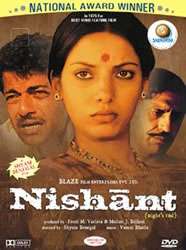Nishant (film)
| Nishant | |
|---|---|
 DVD cover | |
| Directed by | Shyam Benegal |
| Produced by |
Mohan J. Bijlani Freni Variava |
| Written by |
Vijay Tendulkar Satyadev Dubey (dialogues) |
| Starring |
Naseeruddin Shah Girish Karnad Shabana Azmi Amrish Puri |
| Music by | Vanraj Bhatia |
| Cinematography | Govind Nihalani |
| Edited by | Bhanudas Divakar |
Release dates |
|
Running time | 143 min |
| Country | India |
| Language | Hindi |
Nishant (English title: "Night's End") is a 1975 Hindi drama film directed by Shyam Benegal, based on an original screenplay by noted playwright Vijay Tendulkar, with dialogues by Satyadev Dubey.[1]
The film stars Shabana Azmi, Naseeruddin Shah and Smita Patil. This film focus the power of the rural elite and the sexual exploitation of women, during feudalism in India.
The film won the 1977 National Film Award for Best Feature Film in Hindi. The film was selected to compete for the Palme d'Or at the 1976 Cannes Film Festival. The film was invited to the London Film Festival 1976, Melbourne International Film Festival 1977, and the Chicago International Film Festival 1977, where it was awarded Golden Plaque.[2]
Plot
Vishwam (Naseeruddin Shah) is the youngest brother of the powerful and influential village Zamindar (Amrish Puri). The Zamindar will not hesitate to do anything for the welfare and protection of his family, which also includes bending the law to his own advantage. The shy and quiet Vishwam is married to Rukmani (Smita Patil) and, unlike his brothers, does not indulge in alcohol or women, nor does he have any bad habits. Then the village gets a new schoolmaster (Girish Karnad), who has a wife, Sushila (Shabana Azmi). When Vishwam sees her for the first time, he is unable to take his eyes off her, and unable to get her out of his mind. Sushila does not reciprocate his attentions. Then one night, while the schoolmaster is enjoying a quiet dinner with his family, the bell rings and the two older brothers of Vishwam grab Sushila and take her forcibly when she goes to answer the door. Several people are present, but no one dares to raise a hand nor even a voice to stop this abduction. The distraught schoolteacher, who is denied justice by everyone from the local police officer to the district collector, is helped by the old priest (Satyadev Dubey) and finally they succeed in mobilizing the villagers and they slaughter their oppressors. In the end the frenzied villagers also kill the innocent Rukmani as well as Sushila whom her husband tried to rescue with the help of the rebellious villagers.[3]
Cast
- Amrish Puri as Eldest Zamindar
- Naseeruddin Shah as younger brother of Zamindar
- Anant Nag as Anjaiya, youngest brother
- Smita Patil as Rukmini, youngest brother's wife
- Girish Karnad as School master
- Shabana Azmi as Sushila, School master's wife
- Satyadev Dubey as Village Priest (Pujari)
- Kulbhushan Kharbanda as Policeman Patel
- Mohan Agashe as Prasad
- Sadhu Meher
- Savita Bajaj
Reception
The film currently considered as one of the landmark films of Indian art house cinema has received praise from all quarters. The daily newspaper The Hindu praised the movie greatly in its article dated 4 October 2012, in following words "Miles removed from the work of everyday filmmakers, for many of whom cinema is nothing more than a hero waiting in eager anticipation of the heroine and post-dinner desserts, Bengal's “Nishant” (Night’s End) is a dawn that did not come an hour too soon. The National Award for the best film, the nomination for the Oscars were just rewards for a film that lived up to its name. "[1]
Awards and nominations
| Year | Recipient/Nominated work | Award | Result |
|---|---|---|---|
| 1975 | Freni M. Variava, Mohan J. Bijlani | National Film Award for Best Feature Film in Hindi | Won |
| 1976 | Freni M. Variava, Mohan J. Bijlani | Bengal Film Journalists' Association – Best Indian Films Award[4] | Won |
| Shyam Benegal[4] | Best Director (Hindi section) - Bengal Film Journalists' Association Awards | Won | |
| Vijay Tendulkar | Best Screenplay (Hindi section) - Bengal Film Journalists' Association Awards | Won | |
| Shyam Benegal[5] | Palme d'Or | Nominated |
References
- 1 2 Ziya Us Salam (4 October 2012). "Nishant (1975)". The Hindu. Retrieved 2014-09-27.
- ↑ Shyam Benegal Awards
- ↑ Plot summary
- 1 2 "39th Annual BFJA Awards". BFJA. Archived from the original on 2008-01-19. Retrieved 2012-01-06.
- ↑ Nishant - Awards Internet Movie Database
External links
| ||||||||||||||||||||||||||||||
| ||||||